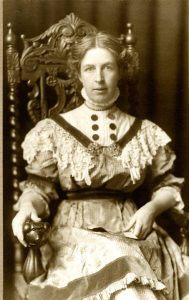
Photo info ...
Credit: Oversize Photograph Collection, Rare Books and Manuscripts, Indiana State LibraryView Source
(Sept. 11, 1865-June 18, 1938). Grace Julian was born in Centerville, Indiana, the daughter of , abolitionist congressman from Indiana, and Laura Giddings Julian, daughter of Joshua Giddings, antislavery congressman from Ohio. Following Julian’s retirement from Congress the family moved in 1873 to Irvington, which had been platted three years before by Grace Julian’s uncle, Jacob B. Julian, and Sylvester Johnson.
She attended schools in and earned a bachelor of philosophy and master of philosophy degrees from Butler University in 1884 and 1885. In 1887 she married Charles B. Clarke, an Indianapolis attorney who had been U.S. deputy surveyor-general under her father in New Mexico Territory.
Grace Clarke was an active club woman in local, state, and national organizations. She founded the Irvington Woman’s Club, and while president of that club helped to organize the 7th District Indiana Federation of Clubs. She was president of the Indiana Federation of Clubs from 1909 to 1911 and was a board member of the General Federation of Women’s Clubs, in which she served as national press chairman. She also served as president of the Local Council of Women.
Clarke’s efforts as an author and editor were varied. For 18 years she wrote a weekly column for the , and for a time also edited a woman’s page for that newspaper. She wrote articles for various publications, including “Notes and Queries,” a series of literary papers written for the . She wrote two books about her father— (Indianapolis, n.d.) and (Indianapolis, 1923)—and edited his (Indianapolis, 1889).
Well known as a speaker as well as a writer, Clarke often lectured on behalf of . She supported that cause as an officer of the Woman’s Franchise League and as the first president of the Legislative Council of Indiana Women, which lobbied the Indiana General Assembly in favor of suffrage legislation. She also traveled around the state giving “14-minute talks” for the Liberty Loan drives during .
Always loyal to the people and interests of Irvington, Clarke served her community and the city of Indianapolis in a number of ways. She was a member of the old Marion County Board of Charities and the City Plan Commission, she headed the Indianapolis’ first employment office under appointment by President Woodrow Wilson, and she was a member of the commission that chose the list of great authors whose names are carved on the outer frieze of the .
Grace Julian Clarke died in the Julian home, which still stands at 115 South Audubon Road, and was buried in .

Help improve this entry
Contribute information, offer corrections, suggest images.
You can also recommend new entries related to this topic.